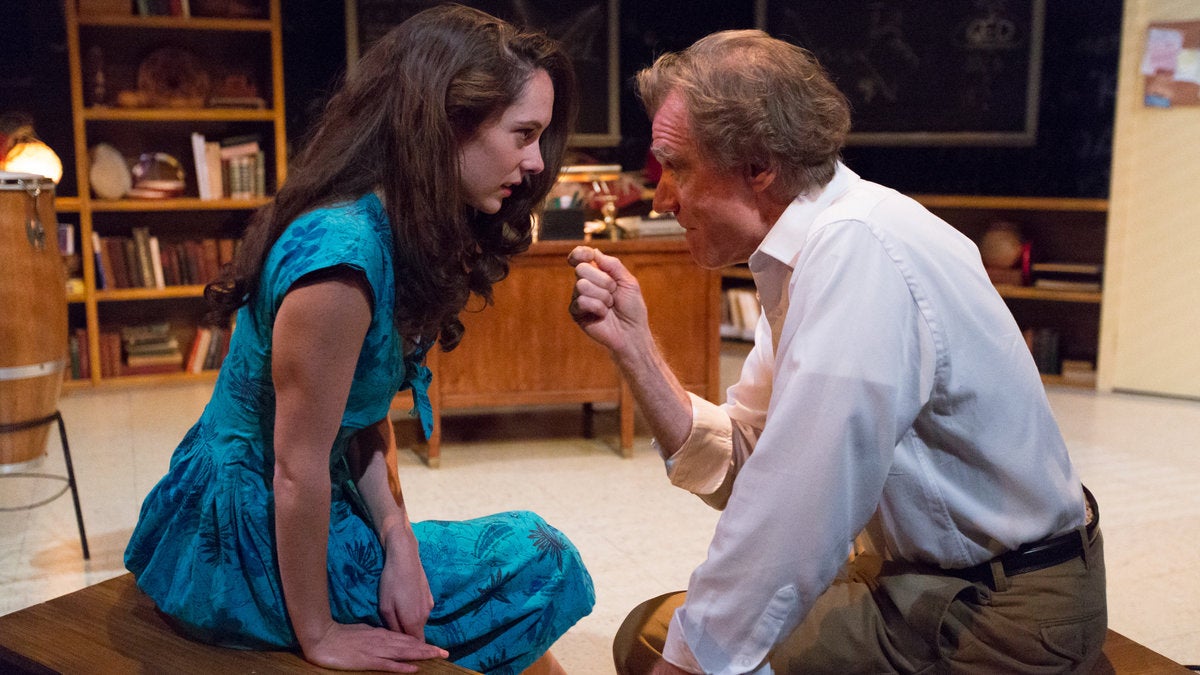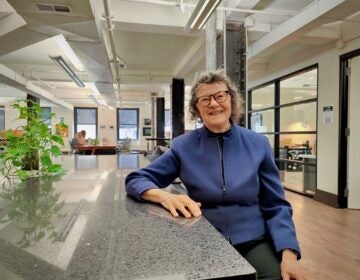Review: ‘QED’ and the nature of probability

Clare Mahoney and Peter DeLaurier in Lantern Theater Company's production of 'QED.' (Photo courtesy of Mark Garvin)
Richard Feynman lived large, and what he got in return was large indeed. Feynman, who died in 1988 at the age of 69, was that most visionary of scientists: a theoretical physicist, a man who specializes in determining probabilities. This alone might make people think he’d be difficult to understand without some knowledge of arcane scientific principals. Yet Feynman was anything but impenetrable.
He wrote, for instance, a breezy collection of reminiscences called “Surely You’re Joking, Mr. Feynman!” He also wrote books explaining science in everyday language, was a beloved professor, was ruggedly handsome and knew it, and easily inspired people. He once ran off with a buddy to visit a place called Tuva (now a part of Russia) on basically a whim, just to learn about it. And, oh, he was a pioneer in the field of quantum electrodynamics, a creator of the atomic bomb, and a Nobel Prize winner. And ultimately, a victim of cancer.
The playwright Peter Parnell gives us an increasingly ill but evermore vital Richard Feynman in his 2001 play “QED” (for quantum electrodynamics), which appeared on Broadway with its most prominent backer, Alan Alda, in the role. In 2006, Lantern Theater Company sold out its own “QED” run in Center City, and has brought the play back with veteran locally-based actor-director Peter DeLaurier recreating the Feynman role he played first time around.
DeLaurier, a remarkably convincing actor who’s excellent in the role, even looks like Feynman before the scientist aged from his illness. “QED” has all the artificial aspects of just about any one-person show, even though it technically is not – Clare Mahoney plays a slyly fawning student who interrupts the professor’s thoughts during the first half and appears for a short time during the second half to involve Feynman in some fluff that colors him awkwardly as a playful you-and-me type, more than an academic paragon.
During the play Feynman never really acknowledges us as visitors. He’s constantly interrupted b the phone. He argues about an official report he’s helping to create involving the fiery and fatal crash of the Challenger spacecraft, and prepares (for unstated reasons) to be in an amateur production of a musical that night. Most importantly, he attempts to create a lecture called “What We Know.” That title’s an irony that drives the play: Feynman delights in discovering knowledge that unlocks the physical secrets of nature. But what he or anybody knows about altering nature to control his uncommon form of cancer is, at best, very little.
“QED” seems at first, forced. Feynman says he can’t find anything on his desk but then finds it quickly, and sometimes he talks as if he’s merely thinking aloud and suddenly shifts into explaining himself, clearly for our benefit. But when Parnell’s script juxtaposes the way Feynman understands probabilities in physics and the way he struggles with decisions about his health, it takes off.
In playing off Feynman’s scientific coups against his uncertainty about the treatment of his cancer, DeLaurier shines, too, under M. Craig Getting’s direction. In the narrow slice of Richard Feynman’s life that “QED” examines, it offers a finely tuned portrait of one man’s irony.
_“QED,” produced by Lantern Theater Company, runs through Dec. 14 at St. Stephen’s Theater, 10th and Ludlow Streets, off 10th Street between Market and Chestnut. 215-829-0395 or www.lanterntheater.org.
WHYY is your source for fact-based, in-depth journalism and information. As a nonprofit organization, we rely on financial support from readers like you. Please give today.




